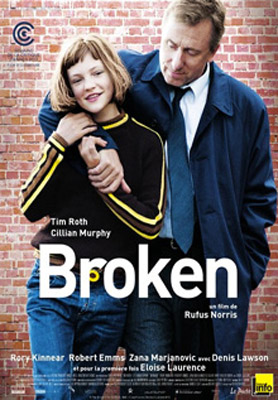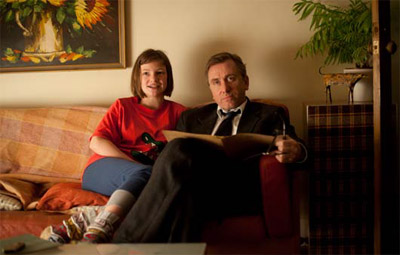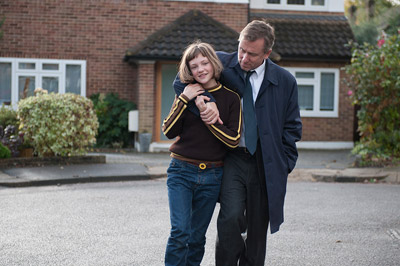Rufus Norris Broken Interview

Rufus Norris Broken Interview
Cast: Tim Roth, Cillian Murphy, Eloise Laurence
Director: Rufus Norris
Genre: Drama
Rated: MA
Running Time: 87 minutes
Synopsis: Premiered as the Opening Night film at Cannes Critics Week and winner of Best British Film at the British Independent Film Awards, Broken is a powerful, captivating and heartbreaking exploration of love in all its many forms: idealised, unrequited, unwanted, and - ultimately - unconditional. Based on Daniel Clay's contemporary British novel inspired by To Kill A Mockingbird, Broken is the directorial debut of award winning theatre director Rufus Norris, who follows in the footsteps of British stage turned film directors Stephen Daldry and Sam Mendes.
Skunk (Eloise Laurence) is 11, pretty cool and wise beyond her years. Her summer holidays have just begun, promising unhurried days and easy hopes. Her lawyer father (Tim Roth) adores her but is perpetually busy, her brother is a pesky older teen and their au pair Kasia is a delightful accomplice to her world especially as Kasia has a dreamboat boyfriend (Cillian Murphy)... who also happens to be Skunk's teacher!
But their cul-de-sac idyll soon has a dark shadow cast over it - and them - and Skunk's innocence begins to be drained away at a speed, and in a way she cannot control. Her home, her neighbourhood, her school become treacherous environments where the happy certainties of childhood give way, and a complex, seemingly broken world may fill her future. Skunk seeks solace in the last remaining place where she knows she can find it - the unspoken friendship with her sweet but off kilter neighbour, Rick.
Broken
Release Date: May 16th, 2013

Interview with Rufus Norris
Question: You're a celebrated theatre and opera director; what kind of artistic satisfaction do you find in cinema?
Rufus Norris: It's a completely different medium, though of course it's all story telling...
The control of detail is exciting, whether through use of close-ups, or in the edit, or with music. There is also something about the accidental or unexpected moments that make stories interesting, and one of the joys of film is that if an accident happens, you have it forever. In theatre the construction requires actors to recreate moments every night, sometimes for months; there is something very liberating about having only to catch it once.
Question: What drew you to this story?
Rufus Norris: What drew me most to this beautiful and incredibly moving story was a two-fold challenge: to capture the essence of this open, vital child whilst having compassion for all the adults who in their separate ways manage to fail her; and to draw an unsentimental and total celebration of life from a seemingly tragic place.
Question: Is it hard for a theatre director to think cinematically?
Rufus Norris: I imagine that depends on the theatre director. I have always thought visually and musically, so that has felt natural; I have also sought out projects that are fresh and take me to places I have not been before, to make myself scared almost, and in that way the new challenge has been very welcome.
Question: What did you learn from this first experience?
Rufus Norris: To take time in every area of preparation, and then let it all go to respond to what is happening in the moment once the shooting starts; to trust myself and those around me in equal measure. To be decisive at all times - it seems the worst crime when shooting starts is to slow things down with prevarication.
Question: Have you ever attended the Cannes Film Festival?
Rufus Norris: No.
 Question: It's often said that a first film is either about what you know or things that trouble you, or compel you. Why did you decide to bring Daniel Clay's novel 'Broken" to the screen? How did you turn it into a very personal work?
Question: It's often said that a first film is either about what you know or things that trouble you, or compel you. Why did you decide to bring Daniel Clay's novel 'Broken" to the screen? How did you turn it into a very personal work?Rufus Norris: I'm a father of children more or less the same age as Skunk, and I have always been a slightly offbeat optimist, like she is, so submerging myself in them was natural. I have a strong dislike of two-dimensional representation of anything, particularly -bad' people, so was very drawn by the opportunity of showing a very dysfunctional neighbourhood without being simplistic about any of the characters. The themes of love, responsibility, parenting and how to co-exist with others are very current, and very close to my life; in practice, that just meant trying to find ways of telling every aspect of the story that felt true to me.
Question: In this compelling drama, tenderness is beautifully juxtaposed with appalling brutality. How did you preserve the empathy and sensitivity of your characters?
Rufus Norris: Firstly, by working with excellent actors. But in life, everyone's actions are justified if you stand in their shoes, and a great appeal of the story was to stand in the shoes of some very different people, who are often perpetrating very unsocial behaviour. I do not condone terrible behaviour, but neither do I have time for the easy demonization that contemporary society is very quick to hand out; compassion is not weak, it's what makes us human and is an essential tool for three-dimensional storytelling.
Question: This ensemble drama is a stunning showcase for actors and relies heavily on their skills. A word about Tim Roth?
Rufus Norris: Tim is very experienced and extremely astute. He doesn't suffer fools, but fortunately I'm not one, and I realised very quickly that he would have a lot of wisdom beyond the character he was playing. He was absolutely fantastic with Eloise from the word go, and her ease and relaxed truth are largely down to his open arms. His performance is beautiful, and speaks for itself.
Question: Cillian Murphy?
Rufus Norris: There isn't a single frame that we shot of Cillian that we could not use. He has no ego in the workplace beyond what is necessary to do the job well, and his sense of humour is a total delight. He is a dream to work with.
Question: Newcomer Eloise Laurence?
Rufus Norris: We saw 850 girls for this role and El came in right at the end, thank god. Working with her was about the easiest experience I have had with an actor. No special techniques or considerations were necessary; she just came in with energy and complete enthusiasm every day. She never once complained, except that it was ending too soon. I thought the greatest challenge would be to keep her natural, to stop her -acting', and I never gave that note once. You worry, of course, that you are in some way corrupting a child who could be spoilt by the experience, the attention. Fortunately, both for her and us, her parents are both totally grounded and I think if anyone can get through it, it is she. She is very musical, and I think it helped that she hasn't acted before, and had no great desire to do anything other than sing.
Question: In a world governed by anger and fear... The book and your film raise the question: 'Is this a good way to be living?"
Rufus Norris: Certainly our society and modern life put us under pressures that have nothing to do with contentment or happiness. Own this, be like this, compete, control your life, etc. For me there is no great answer, no brilliant philosophy, other than to be aware of your own patterns and try to be responsible with regard to others. It's nothing new, and most stories are moral in one way or another, but hopefully this story encourages understanding in some small way.
 Question: The movie probes what makes people break down and explores the kindness and love that might heal and restore. Do you see it as a meditation on innocence? Can it exist in this environment?
Question: The movie probes what makes people break down and explores the kindness and love that might heal and restore. Do you see it as a meditation on innocence? Can it exist in this environment?Rufus Norris: This environment is essentially the same environment that people have lived in for thousands of years, with a few variations. Most of us respond to love, want to be loved, so I think it is a meditation on that, in its several forms. Requited and unrequited, infatuated, romantic and platonic, and finally unconditional, which is perhaps the only trustworthy form. Certainly innocence plays a large part in it - in many ways it can be seen as a loss-of- innocence story, for many of the characters. It is also a meditation on the impossible art of responsible parenting! They all get it wrong, and they all pay the price. Sometimes love is not enough.
Question: British social realism stretches back to the 50s, through the legendary Alan Clarke's 1982 Made In England and Ken Loach, Mike Leigh... Both Peter Mullan, who stars in your short film 'King Bastard", and Tim Roth who stars in Broken, have directed autobiographical films (Neds and The War Zone respectively). It seems that this semi-dormant indie tradition has sprung to life with newfound vigour and confidence (Shane Meadows, John Crowley, Paddy Considine). Are you pursuing the same full-throated assault on British society? Do you feel close to this British trend?
Rufus Norris: I admire those filmmakers enormously, and certainly this story touches on some of those themes, so in that sense, yes. I didn't grow up in Britain, or even Europe, and the areas that I'm interested in would probably apply to anywhere... but inevitably those areas will be framed by where I live, which is here. There are many aspects of British life and governance that I find intensely frustrating, but at the same time I love this Island and its peculiar ways. I hope my work in whatever medium lays bare the inadequacies of our society whilst celebrating our spirit.
Question: Is there a film you particularly admire?
Rufus Norris: Festen by Thomas Vinterburg. Beautiful story, beautifully told. All the effects in Hollywood could never get close.
Question: The script is by Mark O'Rowe, also credited for his work with John Crowley on Boy A (adapted from Jonathan Trigell's novel). Since adapting is betraying, how did you work with him?
Rufus Norris: Well now... if Broken is an adaptation of the book, which is an adaptation of sorts of 'To Kill A Mockingbird", which in itself owes much to Carson McCullers... where do you stop? Shakespeare never wrote an original story, he just wrote old ones in a new way as best he could. We will not reach his excellence, but we can try! I worked with Mark the same way I try to work with everyone - rigorously, respectfully, bravely, and in a way I hope empowers; he knows far more than me about writing and film so I have a huge amount to learn, but I also have clear instincts and I know to follow them. We were thorough, were not afraid to disagree about the small things, and consequently ended up always agreeing about the big ones.
Question: Your DP Rob Hardy, who also worked on Boy A and '1974" from The Red Riding Trilogy, has a very distinctive signature. What were the significant visual choices of your film?
Rufus Norris: We looked at various photographers, watched a few films together and had many frames of reference, but in the end these were not so important. What was important, every day, was to consider every shot, every environment, and see what we could get from it, how we could frame this story in a way that felt deliberate, balanced in tone and tension, without losing touch with the story. Our aim, in a simple sense, was to let the content guide the form. This is a small story with a very big heart, and that required a subtlety and care that Rob is a master of.
Question: The film has original music by Damon Albarn, with whom you worked on your 2011 creation of the opera Doctor Dee for the Manchester International Festival. How did you collaborate? At what point of the production did he start to compose?
Rufus Norris: Damon is part of a group, the Electric Wave Bureau, and I worked with them all on Broken; I've worked with Damon and Mike Smith before and that was very useful in terms of establishing a working language very quickly. All four members of EWB have children the same age as Skunk, so we were like a creatively concerned parents' collective, working out how to tell this story of our worst fears through music. Music was my way into the arts so it's a very important and vibrant area for me, and I'm hugely fortunate that EWB came on board to bring a very distinctive sound to it.
I haven't made any other films, but it seems that many composers of film music have to work round everyone else and be almost invisible. That is not possible or appropriate with EWB, and I wanted them to express themselves like everyone else - they totally got the story and responded to it immediately. The fact that Eloise sings was hugely important. She got on with the team very well and it immediately gave everyone a clear way into it. It's rare for the central character to also be at the heart of the soundtrack, and has been a key part of the whole experience, linking it all together somehow.
MORE
- Mission: Impossible Fallout
- Glenn Close The Wife
- Allison Chhorn Stanley's Mouth Interview
- Benicio Del Toro Sicario: Day of the Soldado
- Dame Judi Dench Tea With The Dames
- Sandra Bullock Ocean's 8
- Chris Pratt Jurassic World: Fallen Kingdom
- Claudia Sangiorgi Dalimore and Michelle Grace...
- Rachel McAdams Disobedience Interview
- Sebastián Lelio and Alessandro Nivola...
- Perri Cummings Trench Interview



